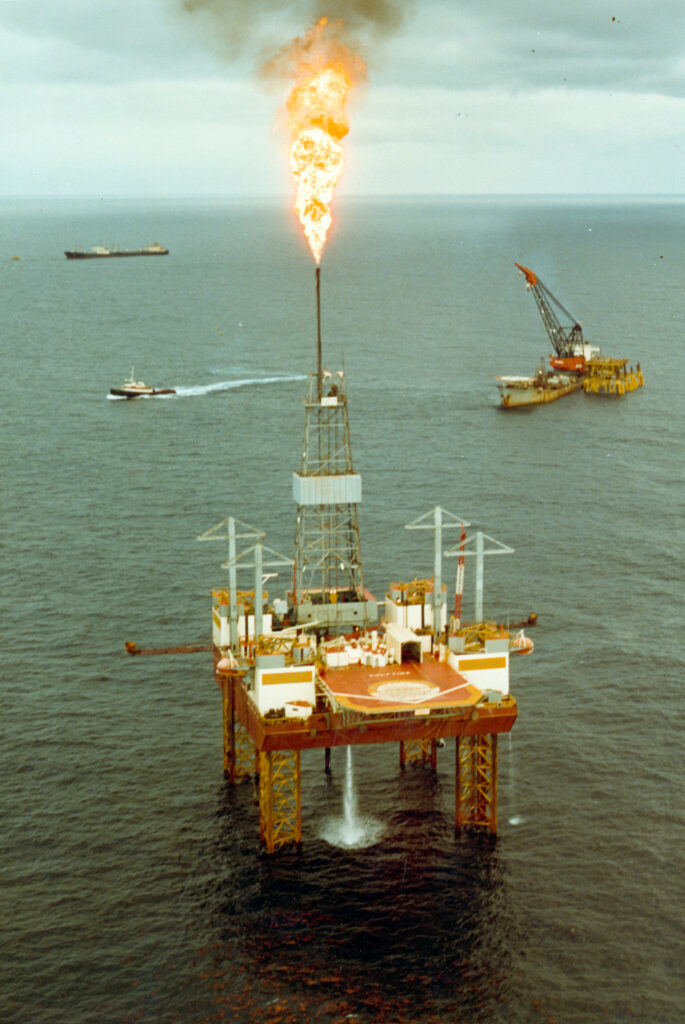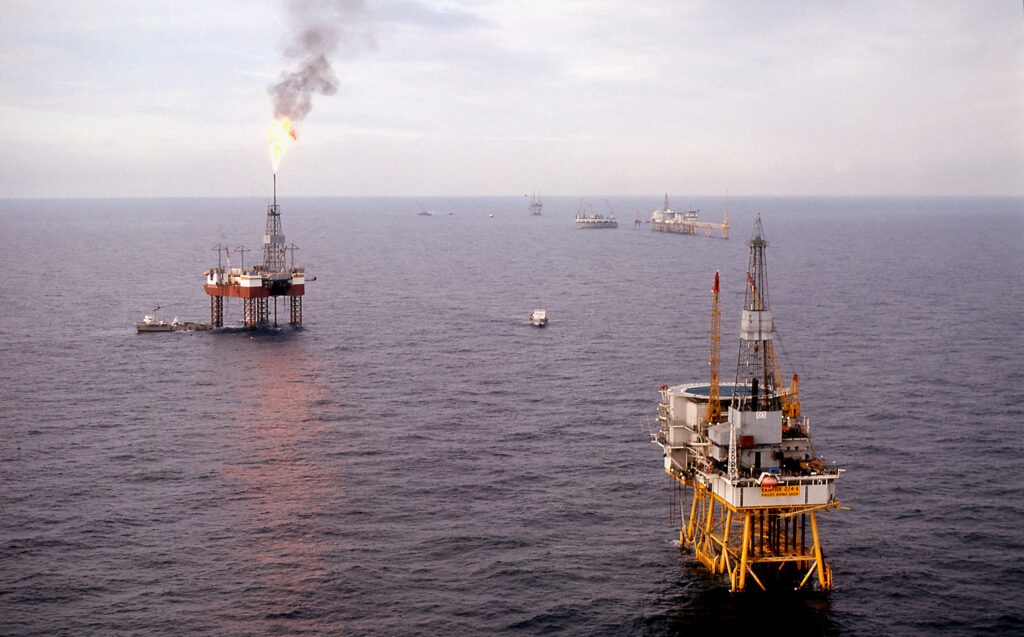Oil policy after the Ekofisk discovery

Ekofisk was discovered virtually against all the odds. Operator Phillips Petroleum had actually sought permission to drop the final well in its drilling programme. But the US company decided to go ahead after all because it would have had to pay the government USD 1 million in any event as well as the cost of chartering the Ocean Viking drilling rig. The bit penetrated an uncontrollable gas pocket after only nine days. Since a little oil was also brought up, it was decided to drill yet another well. Few of the crew had any faith in the outcome and were getting ready to look for other jobs. But their pessimism proved unfounded.
Ekofisk also took Norway’s politicians by surprise. Although the Ministry of Industry had been notified of the discovery just before Christmas 1969, the news was not made public until Phillips issued a press release on 2 June 1970. Plenty of questions needed answering. What would the find mean for Norway? How could Norway’s interests best be protected against the powerful international oil companies in the early phase, before oil operations really got going? What oil policy should the country pursue? Should the state play an active role? And how was that to happen?
Parliamentary focus on Norwegian oil
The industry ministry initiated a number of studies on bringing the oil and gas ashore in Norway and on safety provisions. Since oil production was soon due to begin, a commission chaired by engineer Knud-Endre Knudsen, and named after him, was appointed to come up with proposals for organising state involvement both inside and outside the ministry.[REMOVE]Fotnote: Innstillinger og betenkninger fra kongelige og parlamentariske kommisjoner, departementale komitéer m.m., 1971, Nr. 3.
When the Storting debated the Speech from the Throne on 20 October 1970 Rostoft spelt out the non-socialist government’s view on oil policy:
At the moment, we still know far too little about how large these [oil] resources actually are. What we do know, however, is that billions of kroner will be required over the next few years to clarify this and that, even with spending billions, it might be a washout. We must bear this in mind when drawing up a national oil policy. […] The North Sea oil is making its entry to everyday Norwegian life, with the joys and sorrows, the opportunities and the worries which this brings with it.

Despite Ekofisk, Rostoft was uncertain about the whole oil project. He felt landing production from this discovery and possible others in Norway was not necessary at any cost. He appeared a little relaxed with regard to the state’s role. As industry minister, for example, he wanted to propose the creation of a state-owned company which would have sole rights to seismic surveying on the NCS above the 62nd parallel (the northern limit of the North Sea), but it was not urgent. As mentioned above, the Knudsen commission was considering the future organisation for handling the “oil problems”. Only when this study had been completed in six months time could the government take a final decision of the organisation of state involvement.
The opposition parties in the Storting were far less patient. Ingvald Ulveseth, Rolf Hellem and Trygve Bratteli from the Labour Party all spoke during the Speech from the Throne debate, and were very much in agreement with each other on oil policy. As parliamentary leader of his party, Bratteli’s contribution can be taken as representative for its standpoints. In his view, the Ekofisk discovery showed that Norway was facing a new industrial activity of considerable scope. The government had a big responsibility to protect the interests of Norwegian society. It was essential to build domestic expertise in the meeting with the foreign oil companies. Unlike Rostoft, Bratteli made it crystal-clear that production from the NCS should be landed in Norway. To meet the challenges posed by the new industry, he concluded:
We would propose that preparations are made as soon as possible for a national oil company, preferably state-owned or possibly in a partnership where the state holds 51 per cent of the share capital. Such a company must be able to conduct exploration for as well as production and exploitation of Norwegian deposits.[REMOVE]Fotnote: Proceedings of the Storting 1970-71: 203. Storting debates (bound edn), vol 115 no 7a.
Ulveseth agreed fully with Bratteli where a national oil company was concerned, and also wanted a petroleum directorate:
We also believe that securing full national control of exploration and production in the Norwegian sector of the continental shelf must be a key task. That makes it necessary to strengthen and expand the central administration, possible through the establishment of a separate petroleum directorate.
Hellem’s speech was both forward-looking and internationally oriented. He pointed out that the state in both Italy and France had become involved through state companies in exploration for and production of oil, and exercised control over the activities of the international oil companies. That contrasted with the USA, where privately owned oil companies continued to play an important role in domestic politics. In principle, Hellem believed that the oil and gas resources were the collective property of the Norwegian people, which could best be administered by establishing a state oil company and landing production from the NCS in Norway:
This should be the guarantee of an administration of the people’s collective assets which can best benefit society as a whole. Collecting fees and taxes is not enough.[REMOVE]Fotnote: Storting debates (bound edn), vol 115 no 7a.
Ensuring that the oil wealth benefited society as a whole was to be a constant refrain during oil-related debates in the Storting over the coming years.
Johnsen and oil policy
Formulations in Hellem’s speech during the Speech from the Throne debate have much in common with a memorandum prepared by Arve Johnsen, chair of Labour’s industry policy committee and later the first CEO of Statoil. Johnsen was familiar with the refining and processing oil products from his time at Hydro. When the Ekofisk discovery became known, he believed the Norwegian government had to exploit the industrial potential offered by offshore production, and not rest content with simply collecting taxes. In his view, the oil had to be landed in Norway. That would create the basis for petrochemical industry and for regional development through base construction and equipment deliveries. Johnsen was also concerned with what the oil could mean “for the power relationships in the business community” – in other words, the balance of power between private- and public-sector enterprises in Norway and the relationship between Norwegian and international oil companies.[REMOVE]Fotnote: Hanisch, Nerheim, G., & Norsk petroleumsforening. (1992). Fra vantro til overmot? (Vol. 1, p. 523). Leseselskapet., 1992: 163.
The opinions he had expressed at an early stage appeared to be shared by leading industry-policy spokespeople in the Labour Party.
Borten’s plans
What views Borten, who was prime minister from 1965 to 1971, held about oil policy found no expression in the Speech from the Throne debate. However, that did not mean he had intended to do nothing.
As mentioned above, Rostoft had appointed the Knudsen commission to propose how the state should organise itself in its meeting with the oil industry. Borten himself planned to use Hydro as the government’s instrument in this field. But this intention was kept secret and pursued behind closed doors.

